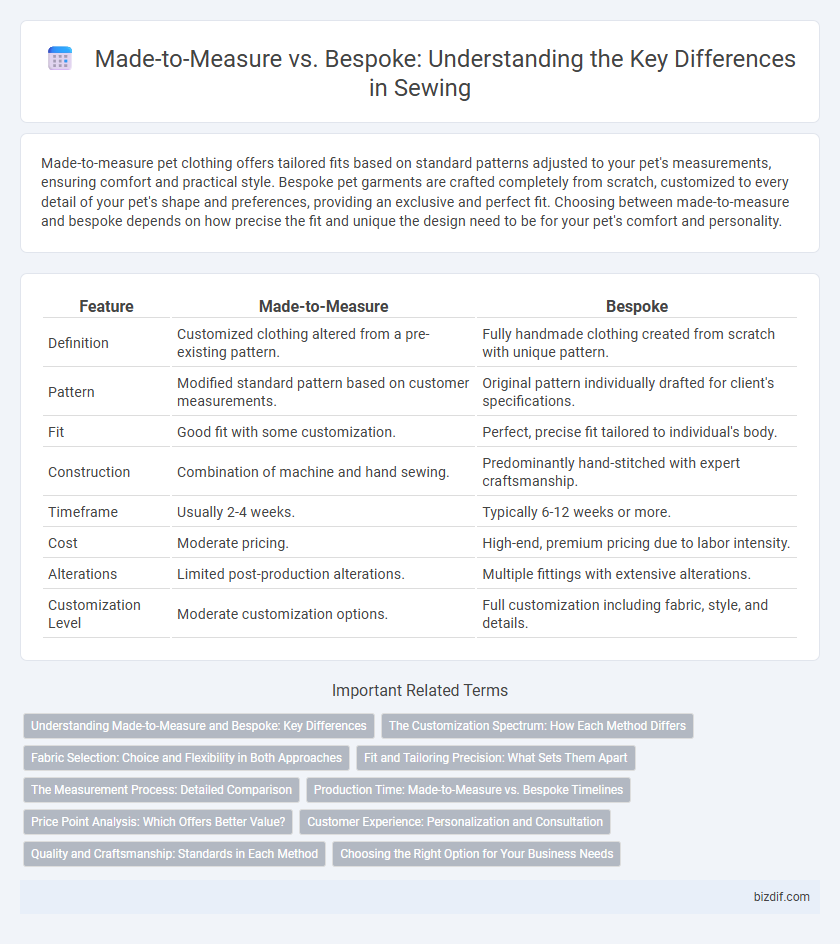Made-to-measure pet clothing offers tailored fits based on standard patterns adjusted to your pet's measurements, ensuring comfort and practical style. Bespoke pet garments are crafted completely from scratch, customized to every detail of your pet's shape and preferences, providing an exclusive and perfect fit. Choosing between made-to-measure and bespoke depends on how precise the fit and unique the design need to be for your pet's comfort and personality.
Table of Comparison
| Feature | Made-to-Measure | Bespoke |
|---|---|---|
| Definition | Customized clothing altered from a pre-existing pattern. | Fully handmade clothing created from scratch with unique pattern. |
| Pattern | Modified standard pattern based on customer measurements. | Original pattern individually drafted for client's specifications. |
| Fit | Good fit with some customization. | Perfect, precise fit tailored to individual's body. |
| Construction | Combination of machine and hand sewing. | Predominantly hand-stitched with expert craftsmanship. |
| Timeframe | Usually 2-4 weeks. | Typically 6-12 weeks or more. |
| Cost | Moderate pricing. | High-end, premium pricing due to labor intensity. |
| Alterations | Limited post-production alterations. | Multiple fittings with extensive alterations. |
| Customization Level | Moderate customization options. | Full customization including fabric, style, and details. |
Understanding Made-to-Measure and Bespoke: Key Differences
Made-to-measure garments are tailored based on standardized patterns adjusted to individual measurements, offering a balance between customization and cost-efficiency. Bespoke tailoring involves creating garments entirely from scratch, with unique patterns developed through multiple fittings to ensure a perfect, personalized fit. Understanding the distinction between these methods is crucial for selecting the appropriate level of customization and craftsmanship.
The Customization Spectrum: How Each Method Differs
Made-to-measure garments are created by adjusting standard patterns to fit individual measurements, offering moderate customization with quicker turnaround times. Bespoke tailoring involves constructing the clothing entirely from scratch, providing complete personalization including style, fabric selection, and intricate detailing. The customization spectrum ranges from made-to-measure's pattern alterations to bespoke's unique creation, impacting fit precision, craftsmanship, and overall exclusivity.
Fabric Selection: Choice and Flexibility in Both Approaches
Made-to-measure and bespoke tailoring offer distinct levels of fabric selection and flexibility, with bespoke providing the most extensive range of high-quality textiles sourced from exclusive mills, allowing for personalized fabric combinations and custom finishes. Made-to-measure typically offers a curated selection of fabrics, balancing quality and convenience, but with less customization compared to bespoke. Both approaches ensure fabric integrity and durability, yet bespoke tailoring allows for greater control over fabric weight, texture, and pattern alignment to achieve a truly unique garment.
Fit and Tailoring Precision: What Sets Them Apart
Made-to-measure garments offer improved fit by adjusting standard patterns to individual measurements, providing a balance between customization and cost-efficiency. Bespoke tailoring involves crafting a garment entirely from scratch, ensuring unmatched precision in fit through multiple fittings and hand-finished details. The key distinction lies in the level of tailoring precision, with bespoke delivering superior fit accuracy tailored to the client's unique body shape.
The Measurement Process: Detailed Comparison
Made-to-measure garments utilize a standardized pattern adjusted with key body measurements such as chest, waist, and hips, allowing faster tailoring with moderate fit precision. Bespoke tailoring involves an intricate measurement process where multiple detailed body points, including posture, muscle contours, and personal fit preferences, are recorded by the tailor for a fully customized pattern. The bespoke measurement process includes several fitting sessions to refine the garment's fit, ensuring unmatched precision compared to the streamlined, fewer measurements taken in made-to-measure services.
Production Time: Made-to-Measure vs. Bespoke Timelines
Made-to-measure garments typically require 1 to 3 weeks for production, as they are based on standard patterns adjusted to individual measurements. Bespoke tailoring demands significantly more time, often between 6 to 12 weeks, due to the hand-crafted process involving multiple fittings and custom pattern creation. The extended timeline in bespoke ensures a higher level of personalization and precision compared to the quicker, but less individualized, made-to-measure option.
Price Point Analysis: Which Offers Better Value?
Made-to-measure garments typically cost 30-50% less than bespoke tailoring due to reduced labor and customization requirements, making them a more budget-friendly option for personalized fit. Bespoke suits offer unparalleled precision through handcrafted construction and extensive client consultations, justifying their higher price with superior quality and longevity. Evaluating long-term wear and tailoring investment reveals bespoke as better value for frequent users, while made-to-measure serves well for affordable custom apparel.
Customer Experience: Personalization and Consultation
Made-to-measure garments offer customers a tailored fit based on standard patterns adjusted to individual measurements, ensuring quicker turnaround times and affordability. Bespoke tailoring involves a fully personalized process with multiple consultations, fittings, and handcrafted construction, resulting in a unique garment tailored precisely to the client's preferences and body shape. Customers seeking an intimate experience and exceptional detail often prefer bespoke services for the highest level of customization and expert craftsmanship.
Quality and Craftsmanship: Standards in Each Method
Made-to-measure garments offer personalized adjustments based on standard patterns, ensuring good quality with efficient production processes. Bespoke tailoring involves creating a garment entirely from scratch, providing exceptional craftsmanship and meticulous attention to detail tailored specifically to the client's body. The superior standards in bespoke result in a unique fit and finish that often surpass the quality found in made-to-measure pieces.
Choosing the Right Option for Your Business Needs
Made-to-measure offers a streamlined production process by modifying standard patterns to fit individual measurements, ideal for businesses seeking scalability and moderate customization. Bespoke tailoring provides fully customized garments crafted from scratch, best suited for luxury brands aiming to deliver exclusive, high-end products with precise craftsmanship. Selecting between made-to-measure and bespoke depends on balancing customer demand for personalized fit against manufacturing time, cost, and brand positioning.
Made-to-measure vs Bespoke Infographic

 bizdif.com
bizdif.com